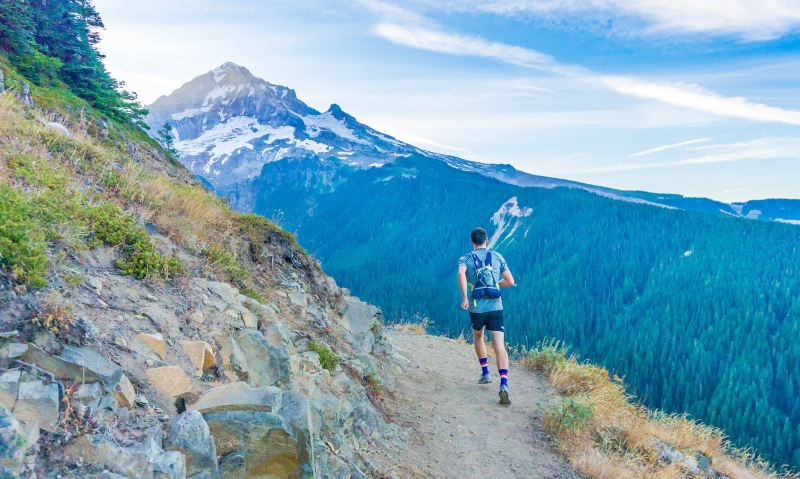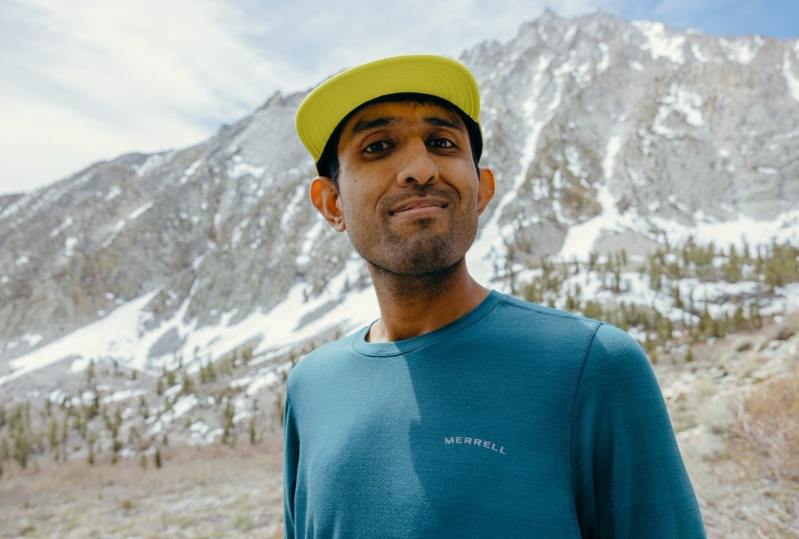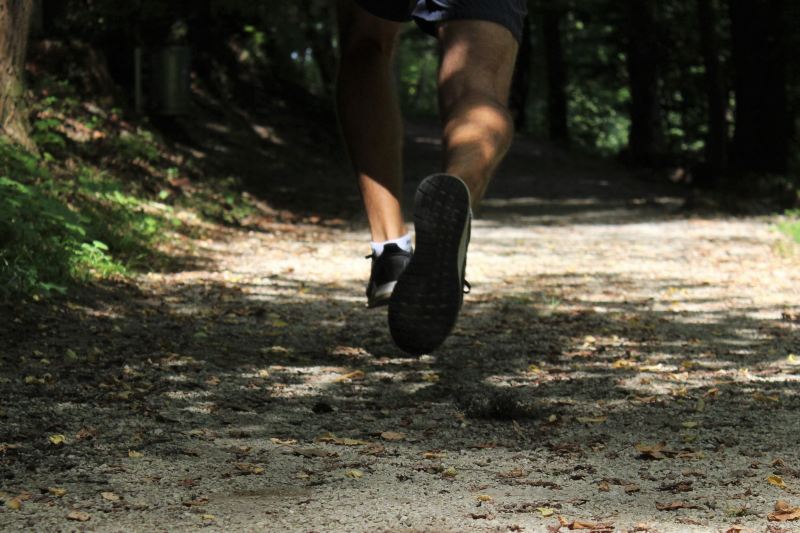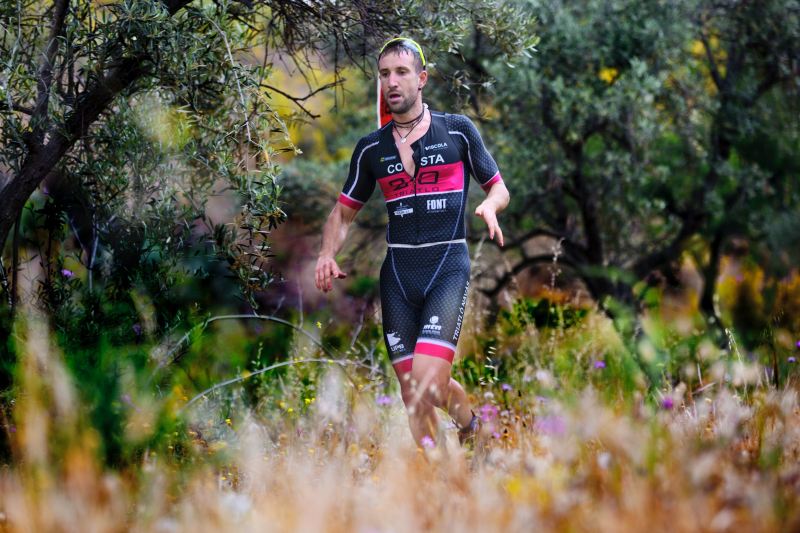
In a world where the demands of daily life can leave us feeling overwhelmed and disconnected, finding effective ways to practice self-care and improve mental resilience has become more important than ever. One activity that has gained significant recognition for its positive impact on mental well-being is trail running. This sport combines the exhilaration of running with the tranquility of nature.
I had the privilege of interviewing Aum Gandhi, a trail runner who discovered firsthand the profound connection between outdoor activities and mental well-being. Join us as we embark on a thrilling journey into Gandhi’s world, exploring the transformative benefits of running and his insights on promoting the powerful link between outdoor activities and mental health.
From struggles to triumphs: A personal journey of transformation

Aum Gandhi’s journey began with a sedentary lifestyle. As an unathletic kid growing up in LA, trail running was something he never thought he would do. But as the stressors of life started to take a toll on his mental health, he knew that something had to change.
“I was working long hours in a civil engineering job, my family was struggling, and I was losing myself,” he said, describing the hardship he went through.
Everything changed when he found running four years ago. Just like that, running became an outlet to relieve stress from life struggles, and Gandhi was hooked. Through consistent training and perseverance, he gradually progressed from running 30 minutes to completing 5k races.
Then he discovered trail running when the pandemic hit, and he’s never looked back. In July of 2020, he completed his first 50k race while training for his first 100-mile race. In October of 2022, he became the first athlete on paper to represent India at the Moab 240 race, which is 238 miles long with about a 29,000-foot elevation gain in an extreme desert environment.
Despite not finishing the race due to a blown-out hip at mile 235, Aum is so proud of his accomplishments.
“What I learned is that in ultra-marathons and in life, it is about the journey, not the end result,” he said. “In life, if we’re only taking goals we are certain of finishing, there isn’t room for growth. The essence of adventure is a process in which we don’t know what the end result might be!”
Today, Gandhi challenges himself time and time again. Here he shares the incredible mental health benefits that he’s discovered throughout his years on the trail.
On-trail and off-trail benefits of trail running

“Being rooted in the trails just brings so much out of you,” Gandhi said. He has reported increased strength mentally, physically, and spiritually whilst on the trail.
He experiences plenty of benefits off-trail, too. “Life makes us endure many trials and tribulations that affect our mental health, and it’s my honor to show through action how the trails can help you prepare for life.”
Through trail running, he has been able to raise funds for charities such as the Richstone Family Center, which is an organization dedicated to treating and preventing childhood abuse and trauma. His trail running enables him to make the world a better place.
Building resilience through trail running

Trail running offers individuals a unique opportunity to overcome mental challenges and build resilience. Gandhi emphasizes that maintaining a positive attitude is crucial in both ultra-running and life.
“So much of this sport is mental, so training your mind is just as important as training your body,” he said. “Having that discipline, drive, and willingness to learn makes you unstoppable. I believe we can do hard things, and by doing hard things, we become resilient and are given the tools to balance our mental health.”
There were so many times that he wanted to quit, especially during his first year of running. Honestly, there were more bad days than good in the beginning, but he persevered and is now doing the impossible.
How does he persevere? By reframing situations and accepting what is beyond control, individuals can reach new heights and achieve their goals. Trail running helps people develop discipline, drive, and a willingness to learn, providing them with the necessary tools to balance their mental health effectively.
The power of mindfulness and meditation in trail running

In the world of trail running, where physical strength and endurance are put to the test, one often underestimates the significance of the mind. But for Gandhi, mindset is everything. There are two key strategies that Gandhi used to persevere during the hardest days: Keeping a positive mindset and keeping a powerful mindset.
Keeping a positive mindset
Gandhi was once told that the past is fear and the future is anxiety. “The present is really all we have control over, with tomorrow not being a guarantee,” he said.
To him, this means that becoming the most positive version of himself is a daily choice. By showing up for himself every day and choosing to focus on what he can do in the present, Gandhi utilizes the power of perfect attendance to do the impossible.
Keeping a powerful mindset
During our interview, Gandhi outlined five key points to keeping a powerful mindset. Have a look!
- Mood follows action: No matter what mountain you’re facing, just do something. The best you can do is the right thing, and the next-best thing is the wrong thing. The worst thing to do is nothing at all. Doing something about your problems often leads to a better mood and healthier mindset.
- Attitude is half the battle: What you’re doing is already hard enough, so why become your worst enemy?
- Stop demonizing failure: Failure is only the end if you say it’s the end. Think of failure as being one step closer to success.
- Be kind to yourself: Often, we are our worst enemies. If you learn to love yourself, you can persevere through anything. Gandhi says that it starts by telling yourself each morning that “you got your back.”
- Be kind to others: Everybody is fighting something, so don’t be a jerk. There’s plenty of room at the top for everyone. Your legacy isn’t about personal achievements — it’s about how you make others feel. Lift others up and everybody wins.
Cultivating consistency and motivation while trail running

Above all, consistency is key. Gandhi really means that. He prefers to have shorter workouts of about 15–20 minutes for legs, core, and upper body about six days a week. It’s far better to maintain strong form during a shorter workout than it is to power through a long workout with bad form. In the end, it’s more about consistency, not intensity.
That said, Gandhi is adamant about being flexible in your training regimen. “Live life, work hard when it matters, and rest when it matters,” he said. Even pros like him take unplanned rest days. For about four to five weeks every year, he lowers his mileage and even lets himself gain a little weight.
Listen to your body and you’ll know how hard to push yourself. For example, if you didn’t sleep well, shorten your run; if you’re feeling great, push yourself and go a bit longer. Gandhi’s sustainable outlook on consistency and motivation is a breath of fresh air.
Gandhi’s vision for the future: Promoting outdoor exercise and mental health

When asked about his aspirations for the future, Gandhi said he wants to share his story as a non-athlete-turned-trail-runner to anyone and everyone. His inspirational story continues to draw people outdoors to experience the mental fortitude that comes with trail running, and he couldn’t be happier.
To further that goal, he recently became one of Merrell’s first U.S. athletes.
“It’s like a pinch-me moment to be a pro athlete. . . I’m lucky in the sense that the brand wants me to just be the best version of myself,” he said when speaking about how his values of inclusivity and joy line up with the brand. As a sponsored athlete for Merrell, he aims to inspire others further.
Aum Gandhi’s journey from adversity to triumph exemplifies the transformative power of trail running in improving mental well-being. His insights into maintaining a positive mindset, incorporating mindfulness practices, and promoting the connection between outdoor activities and mental health offer valuable guidance for individuals seeking to improve their self-care.



